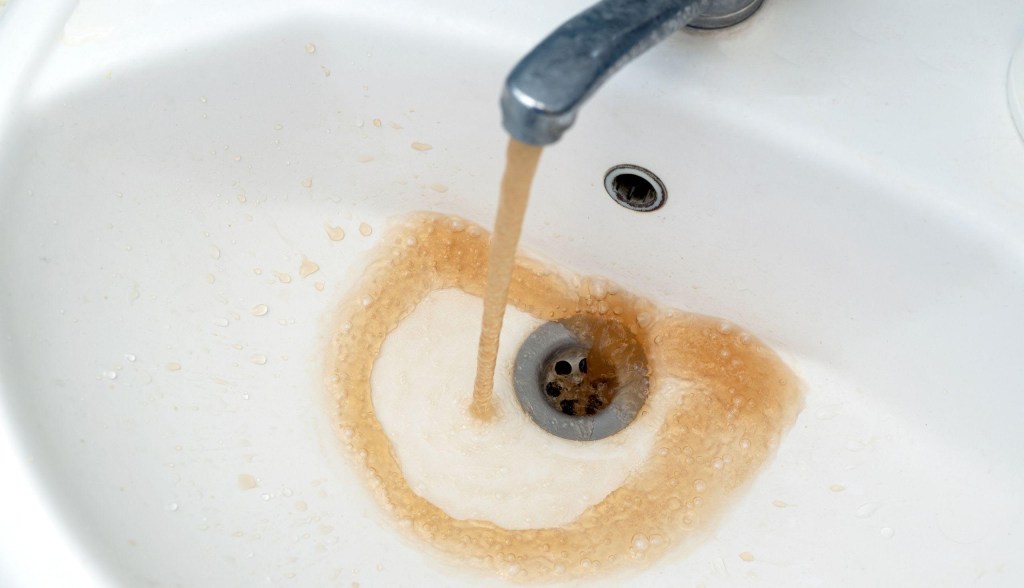
Why Does My Water Look Brown?
Summary: Brown or discolored tap water is most often caused by rust, sediment, or mineral buildup in pipes and is typically harmless, though it may have an unpleasant taste and appearance. In some cases, discoloration can indicate plumbing issues or potential contamination, which can be addressed by flushing the system, contacting your water supplier, or using advanced filtration to restore clean, clear water.
Jump to the key takeaways
Brown water can be caused by the corrosion of water pipes as materials flake away and find their way into water supplies, making the water an orange-brown color (from iron pipes) or even black (from lead pipes). Certain elements from sulfur dioxide can cause water to turn brown when combined with hot water.
Has brown water recently come flowing through your taps? It may have been caused by an increase in the number of minerals, rust particles, or other sediments in the water pipes supplying your home with drinking water.
Many people have experienced brown tap water and although this is an inconvenience and can be damaging to clothes and fixtures, it is not a serious health concern. Despite this, we would not recommend drinking any brown water as it could have an unpleasant taste.
What causes my water to look brown?
Over time, corrosion deposits such as rust and minerals can become trapped in the water lines and make their way into your plumbing system in several ways. This can be the result of:
- Longstanding water becoming weighed down with oxidized iron particles
- A surge in water flow through the pipes due to increased demands
- Fire services using hydrants for emergencies
- Resuming water flow after repairs or routine flushing
- Old or damaged service pipe – this connects your domestic pipes to the mains distribution system
Any of the above can disturb the rust particles and other sediments that have settled at the bottom of the water pipes. Despite municipalities doing their best to implement filtrations and carry out rigorous testing, the water can become discolored by the time it reaches your tap.
Is brown water safe to drink?
Brown water may, understandably, cause alarm and spark concerns about its safety for consumption. Fortunately, this discoloration is typically a result of sediment, rust, or other particles accumulating in the water supply. So, while it might not be aesthetically pleasing to look at, it’s generally safe to drink.
However, it’s important to address any underlying issues that could be contributing to a brown water supply, like problems with your plumbing, municipal water treatment, or distribution system. Talking to a local water quality expert is a great way to learn about your drinking water and how to keep it clean, clear, and tasty in the long run.
The importance of drinking clean water
With fresh, clean drinking water being a vital resource, we rely on public water systems to treat and deliver clean water to our homes, schools, and businesses. Drinking clean water and staying hydrated helps remove toxins from your body, serves the functionality of several organs, and can improve the emotional outlook of individuals.
What are the risks of drinking contaminated water?
While drinking brown water is generally considered safe, consuming contaminated water is a different story. Here are some of the risks of drinking water with impurities:
- Contaminant exposure: Elevated levels of contaminants such as rust, sediment, or organic matter may pose health risks like gastrointestinal issues or infections if ingested regularly.
- Microbial growth: Discoloration in water could indicate the presence of bacteria or other microbes, which may lead to respiratory infections or allergic reactions.
- Chemical contamination: Potential chemical contamination from sources such as industrial runoff or agricultural pesticides can cause adverse health effects, including gastrointestinal issues, neurological disorders, and cancer risks.
- Lead contamination: Brown water that indicates corrosion in plumbing systems may lead to lead leaching into the water. According to the Centers for Disease Control and Prevention, chronic exposure to lead can result in developmental delays, neurological issues, and other health problems — especially in children.
- Health concerns: Vulnerable individuals, like those with weakened immune systems, pregnant women, infants, and the elderly, may be particularly susceptible to the health risks associated with drinking potentially contaminated water.
What should you do about brown water?
In most instances, the water should begin to run clear after a couple of hours of activity or after you have run the cold faucets for a few liters. Should your water be running brown after 24 hours, and if surrounding neighborhoods are also experiencing brown tap water, it is advisable to contact the local council as the problem is likely to be beyond your domestic pipes.
Your local water supplier can inspect your pipes more closely, identify the root cause of the brown water, and has the authority to use a fire hydrant to flush out any remaining brown water. You also can ask whether they monitor their water for secondary contaminants as supported by the Environmental Protection Agency (EPA). Secondary contaminants do not pose a health risk but can affect the way your drinking water looks, smells, or tastes.
Run the cold and hold water to establish whether the brown water is coming from hot or cold water. If the brown tap water is from hot water, your water heater may need to be flushed out or replaced.
If you want to ensure that your tap water is clear every time, check out Culligan Quench’s filtered water systems. Our systems filter out sediment and contaminants that cause discolored water, resulting in better-tasting, cleaner, and safer drinking water. That way, you can stay hydrated without stress.
To learn more about Culligan Quench’s water filtration systems, browse our collection or get matched with the water solution that best suits your needs.
Musty, dirty, or sulfur-like odors in tap water are often harmless but can signal underlying environmental, plumbing, or contamination issues that are important to address for peace of mind and water quality.
- Common environmental causes: Decaying organic matter and sediment entering city water supplies or wells are the most frequent reasons for earthy or musty water odors.
- Plumbing-related factors: Pipe erosion can introduce trace metals like copper, iron, or lead, which may negatively affect water smell and taste.
- Potential contamination concerns: Hydrogen sulfide or sulfur bacteria can cause rotten egg odors and may indicate sewage or pollution that requires prompt attention.
- Effective solutions: Advanced filtration systems using technologies like activated carbon and reverse osmosis can reduce odor-causing contaminants and restore clean, great-tasting water.
- When to test your water: If odors persist or contamination is suspected, professional water testing through local health departments or certified labs can help identify the source.

